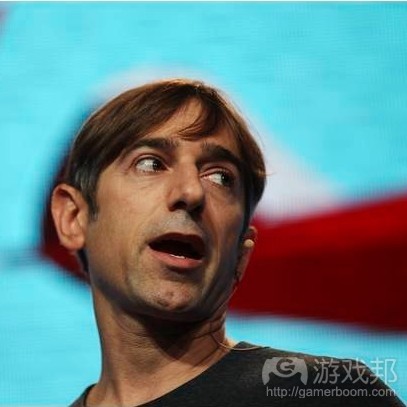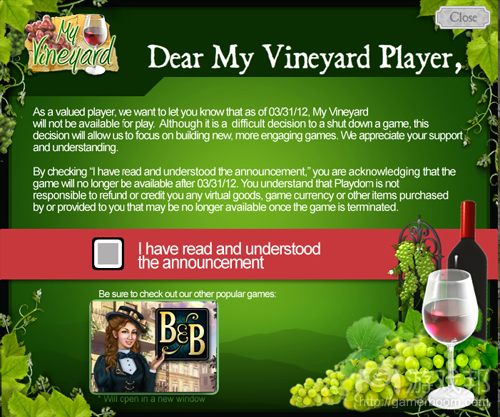每日观察:关注谷歌云游戏服务Native Client(3.10)
1)谷歌开发倡导者Colt McAnlis在GDC大会上推介了谷歌最新云游戏服务Native Client,声称该服务可助传统PC游戏开发者方便快捷地向Chrome Web Store和Google+移植游戏。
据其所言,Native Client支持开发者无需插件就能在网页运行C++代码,这意味着那些为Xbox 360等平台编写和发布游戏的AAA开发者,可使用Native Client将同种代码将其编译到网页平台环境。
McAnlis还强调称谷歌不会向将游戏移植到Chrome Web Store或Google+平台的开发者收取任何费用,只有使用Google Wallet支付服务的开发者才需出让5%的抽成。谷歌目前已同Square Enix和育碧等大型游戏公司以及一些小型工作室达成合作协议。
2)据BusinessWeek报道,Zynga首席执行官Mark Pincus在最近采访中表示,Zynga推出自有社交游戏平台Zynga.com这个项目并不会让Facebook感到意外,因为两家公司自合作之初起就讨探过此类问题。
尽管许多人认为,Zynga此举意在摆脱对Facebook的依赖,并避开Facebook的30%抽成,但Pincus称事实并非如此。因为在 Zynga.com玩游戏也等于在Facebook玩游戏,玩家在Zynga.com时仅需一键操作就能连接到Facebook。另外,用户在该平台向 Zynga购买虚拟商品时,也仍然需要使用Facebook支付服务,Facebook仍可从中抽成。
3)迪士尼社交游戏工作室Playdom日前宣布将于3月31日关闭Facebook游戏《My Vineyard》(游戏邦注:据AppData数据显示,该游戏目前仅剩13万MAU和1万DAU),玩家在游戏中的购买的虚拟商品也将在当天失效,Playdom推荐玩家转向新游戏《Blackwood and Bell Mysteries》。
据该公司前制作人Tami Baribeau所称,《My Vineyard》过去的繁荣发展,曾是Playdom收购其原创开发商Metaplace的主要原因。
4)《Astro Garden》是一款由6waves Lolapps发布的新款Facebook农场游戏(《Astro Garden》实际上与Red Spell原来开发的另一款游戏《The Big Farm Theory》相同,据发行商所称,后者目前仍处于运营阶段,但不会进行推广),其任务要求玩家重建被暴风雨摧毁的村庄和农田。
该游戏采用了高质量的音效、话语和音乐,以及3D预渲染视觉效果,但游戏文本中仍有一些拼写和语法错误。该游戏目前共有30万MAU和6万DAU,其“双胞胎”作品《The Big Farm Theory》有14万MAU和4万DAU。
5)在本周新晋游戏(MAU低于100万)榜单上,Playfirst作品《美女餐厅》MAU增长3倍并攀升至榜首,但奇怪的是,该游戏在2011年8月份就已经被关闭。
排名第二的游戏名称与Valve射击游戏《反恐精英》相同,实际上这款Facebook根本就不是射击游戏,而是一款滚动厕纸游戏,并且含有导向其他Facebook应用和页面的链接。
除了《美女餐厅》之外,《Solitaire Blitz》(EA)、《Legyen Ön is Milliomos! játék》(匈牙利语,它是成为“百万富翁”类型的游戏,但该游戏因专利权问题而将在下周停止运营)、《 Ball Rain》(MindJolt)、《Blackjack》(Zynga)和《Bowman》(MindJolt)增幅也都超过了100%(游戏邦注:《Blackjack》是Zynga下一款博彩游戏,目前是将玩家导向《Zynga Poker》)。(本文为游戏邦/gamerboom.com编译,拒绝任何不保留版权的转载,如需转载请联系:游戏邦)
1)Zynga CEO Mark Pincus: Zynga.com ‘was no surprise’ to Facebook
by Joe Osborne
Zynga.com, Project Z, Zynga Direct, what have you gained considerable steam after signing on big-time traditional game creators like Contra’s Konami and Aliens vs. Predator maker Rebellion.
Considering Zynga stands to draw even more game developers away from Facebook proper, in a way, you’d think Facebook would feel some type of way about that.
Not according to company CEO Mark Pincus, who told BusinessWeek’s Charlie Rose that, in fact, Facebook had been in on it since the two companies started holding hands. “This has been envisioned in our relationship with Facebook since the beginning,” Pincus told BusinessWeek. “There was no surprise, and we’ve collaborated on it.”
Many see Zynga.com as the first step in the social game giant’s attempt to distance itself from Facebook. Facebook gouges Zynga for 30 percent of its revenue on every cow, outfit or sliver of energy purchased by players, so this writer can see where one would get that idea. But since Facebook is ever present in Zynga.com, Pincus says that’s simply not the case.
“No.1, when you’re playing games on Zynga.com, you are also playing games on Facebook. This is doubling down on our partnership with Facebook,” Pincus said to BusinessWeek. “Go to zynga.com and you have one simple button you push to connect your Facebook identification and log on to Zynga the website, as a FB-connected website. And then you access the same games you played with us and your same friends and your profile and identity. When you purchase with us, you’ll still be using Facebook payments, and Facebook will get the same revenue. It’s a win for us either way.”
Pincus then went into detail on how he and Facebook CEO Mark Zuckerberg are practically besties, reminding Rose that he is one of Facebook’s first investors. Check out the interview in full here.(source:games)
2)Google+ and Native Client: A safe haven for hardcore game makers?
by Joe Osborne
Google may have just made its biggest gaming play yet. During the Game Developers Conference in San Francisco, Google developer advocate Colt McAnlis pimped the company’s newest technology for web-based gaming: Native Client. What it does essentially is allow traditional PC game developers to easily bring their games to the Chrome Web Store and Google+.
“Native Client is a technology that allows you to run C++ code in a web page with no plug-in, which is kind of amazing,” McAnlis described, according to GamesIndustry International. “That means that these AAA developers who write code and shipped it on Xbox 360, like From Dust right here, can actually take this same code, compile it with Native Client, and put it right in a web page.”
Nuts and bolts aside, this allows games that were traditionally exclusive to PCs and game consoles to live again in the browser. (Of course, we imagine that gamers would still need beefy hardware to run such games–this isn’t Gaikai or OnLive.) In theory, it’s a hardcore PC game maker’s dream come true, as it has the potential to turn any PC game into a social game.
“We announced on Monday that Native Client games are now able to play on the Google+ canvas. This means that you can actually run C++ code on Google+. You get the full graph, you get full interaction with everything,” noted McAnlis, according to GI International.
Better yet, McAnlis said that Google will not charge developers a dime to bring their games to either the Chrome Web Store or Google+, but will take a 5 percent cut should they opt to use Google Wallet for payments. Google already has big-time game makers like Square Enix and Ubisoft on board, along with other smaller studios. If this Native Client initiative pans out, Google could very well have found its social gaming niche.(source:games)
3)Playdom shutters My Vineyard, crush your final grape March 31
by Joe Osborne
As if coming down off the high of inspiration that is Game Developers Conference, Playdom has decided to focus its resources on creating new games at the expense of My Vineyard. The Disney-owned social game maker has announced that My Vineyard will be no more come March 31.
As of this writing, the My Vineyard is home to just 110,000 monthly and a mere 10,000 daily players, according to AppData. Unfortunate as this is, a move like this isn’t at all surprising given the numbers. When players log into the game, they’ll be greeted by a message that requires them to acknowledge that they’ve read it before revisiting their vineyard, perhaps for the last time.
What will be the ultimate bummer for players, however, is the fact that they’re in-game purchases (with real money, mind you) will be for naught come March 31. And all Playdom offers for compensation is to point them toward its newest game, Blackwood and Bell Mysteries.
It’s a true shame to see My Vineyard go, especially considering that it’s what pushed Playdom to acquire its original developer, Metaplace, according to former producer Tami Baribeau. Unfortunately for Playdom (and its fans), this is just the most recent in a string of game closures, including role-playing game Deep Realms and Social City. Hey, don’t be too blue, folks: At least Playdom’s hidden-object business and Marvel branding bonanza are going places.(source:games)
4)Grow your crops and strive for eternal life in Astro Garden
Pete Davison
Astro Garden, a new Facebook game published by 6waves Lolapps, is a farming game with a twist. Players start with an impressive-looking farm that already has growing crops, healthy animals and a variety of curious buildings, but within a few moments a thunderstorm rolls in and destroys everything, wiping out the player character’s memories in the process. Thus begins a quest to rebuild whatever it was the player was doing prior to the game’s opening — a quest which culminates with the discovery of the elixir of eternal life.
Note that Astro Garden is actually the exact same game The Big Farm Theory, which Red Spell developed prior to signing a publishing agreement with 6waves Lolapps. A spokesperson for the publisher tells us the original game is still live as a favor to players that don’t want to restart the game from scratch. That version, however, will not be marketed.
Astro Garden sees players attempting to regain their lost memories through rebuilding their garden. For the most part, this process takes the form of fairly conventional farming gameplay — planting crops, clearing debris, feeding animals, creating meandering paths and building special structures. The game features a number of twists on the formula, however, making it a worthwhile experience to explore even for veterans of the genre.
The most obvious addition to the basic mechanics comes in the form of the “hybrids” system. Once the player has constructed a Laboratory building, they are able to research new forms of crops, resources and special items by spending combinations of components collected through exploration and debris-clearing. Rather than providing a linear research path, the “tech tree” approach taken (where later research is dependent on one or more prerequisite technologies) is strongly reminiscent of more complex strategy titles such as Sid Meier’s popular Civilization series. The eventual goal of the game is to complete the tech tree and construct the Elixir of Eternal Life, but along the way the player gains the ability to grow a wide range of mutated crops in their garden, which can subsequently be sold for considerably more profit than their naturally-occurring brethren.
Alongside this, the game incorporates a “Combo” system similar to that seen in Familiar Ville, which we reviewed last week. Collecting reward items in rapid succession adds to a meter at the top of the screen, and filling this meter provides the player with soft currency, resources and a temporary multiplier to subsequent rewards. The amount of time players have to build their combo before it expires is considerably more generous than that seen in Familiar Ville, though the timer doesn’t stop when popup windows appear on screen, meaning players can easily lose an impressive combo when dismissing quest completion dialogs. To assist with building up a combo when the on-screen action becomes hectic, however, the player has the opportunity to acquire “pet” characters who will automatically wander around and collect any dropped reward items quickly without the player having to roll the mouse over them.
Another welcome addition is the opportunity for players to use collected “food” resources to generate energy-restoring items rather than being obliged to spend hard currency on extended play sessions. The latter option is still available, of course, but this catering to non-paying players will likely be gratefully received.
Astro Garden is mostly polished with high-quality sounds, speech and music presented alongside distinctive 3D prerendered visuals. There are a few spelling and grammatical errors in the game’s text, however, and one of the music tracks used in the game persistently cuts off early. These little flaws take the “professional” edge off the game slightly, but despite this it does an eminently good job of adding some very welcome new ideas to the somewhat tired farming genre.
Astro Garden currently has 300,000 monthly active users and 60,000 daily active users. Its identical twin The Big Farm Theory currently has 140,000 monthly active users and 40,000 daily active users. You can follow their progress with AppData, our traffic tracking service for social games and developers.(source:insidesocialgames)
5)Diner Dash mysteriously reappears at the top of this week’s emerging games list on Facebook
Mike Thompson
Playfirst’s Diner Dash tripled its monthly active users and scrambled to the top of our list this week, which is odd as the developer shut the game down in August. We’ve contacted Playfirst to find out what caused the spike.
The No. 2 spot on the list looks to be an illegal port of the Valve shooter Counter Strike. In reality, this isn’t a shooter at all: it’s a toilet paper-rolling game with links to other (legit) Facebook titles placed around the page. This isn’t the first time a Counter-Strike impostor has come to our attention, Counter Strike Red Team Go appeared on Facebook back in 2008 and was quickly dismissed as “a cheap knock-off and cash in that rips the soul out of game and puts it in an easily accessible web format.”
Retro World, meanwhile, continues to gain traction. The game is now at No. 3, thanks to media attention over its new I Love Lucy expansion from last week.
Aside from Diner Dash, five other games saw gains of 100 percent or more: EA’s Solitaire Blitz, Legyen Ön is Milliomos! játék (“Become a Millionaire! game”), MindJolt’s Ball Rain, Zynga’s Blackjack and MindJolt’s Bowman. We’re fairly sure that Blackjack is indeed Zynga’s next title to appear in the Casino franchise; the app, however, currently directs players to Zynga Poker. We’ve reached out for comment.
Finally, don’t expect to see Legyen Ön is Milliomos! játék on the list next week, though, since the title’s Facebook page has a message — in Hungarian — explaining that the game has ceased operation because of something having to do with the European Union being a patent holder.(source:insidesocialgames)












































 闽公网安备35020302001549号
闽公网安备35020302001549号